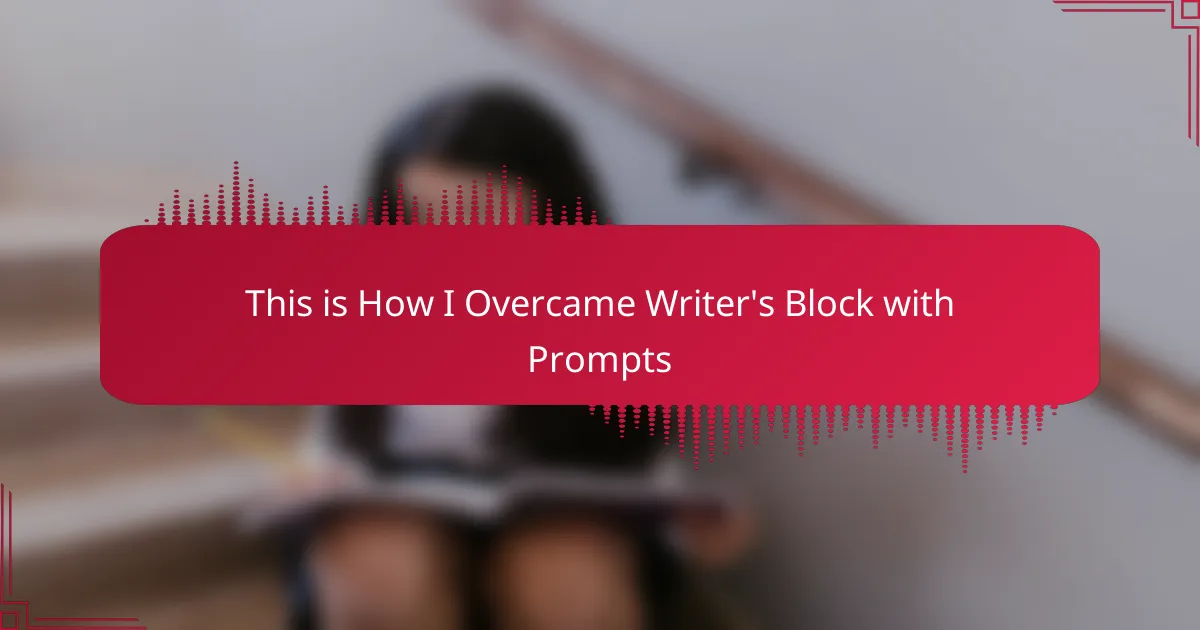Key takeaways
- Writer’s block often stems from fear of criticism and self-expectations; acknowledging feelings and understanding triggers can help overcome it.
- Writing prompts serve as valuable tools to spark creativity, providing structure and encouraging exploration of different narratives and themes.
- Different types of prompts (character-driven, scenario-based, thematic) enrich storytelling and deepen character development.
- Building a prompt library allows for on-demand inspiration, transforming writer’s block into an exciting challenge.
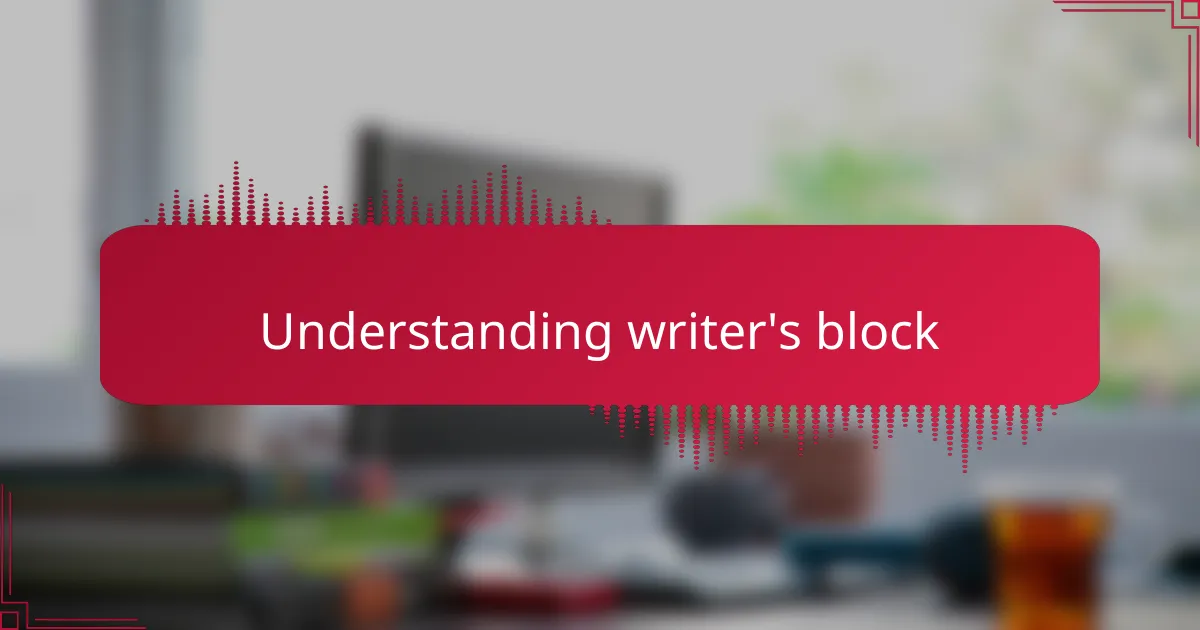
Understanding writer’s block
Writer’s block can feel like an impenetrable wall. I remember staring at my computer screen for what seemed like hours, the cursor blinking mockingly at me. This frustration is common; we often find ourselves frozen, unable to translate our creative thoughts into words.
I realized that understanding the root of my writer’s block was crucial. It wasn’t just about having a blank page; it was about fear—fear of not meeting my own expectations or of the criticisms that might follow. In my journey, I discovered a few key insights that helped me break through that block:
- Acknowledge your feelings; it’s okay to feel stuck.
- Identify triggers of your block, whether they are external pressures or internal doubts.
- Set small, achievable goals to regain confidence in your writing.
- Experiment with different writing environments to spark creativity.
- Use writing prompts to shift your focus from perfection to exploration.
Every creator experiences this struggle, but recognizing it can empower you to find ways to move past it.
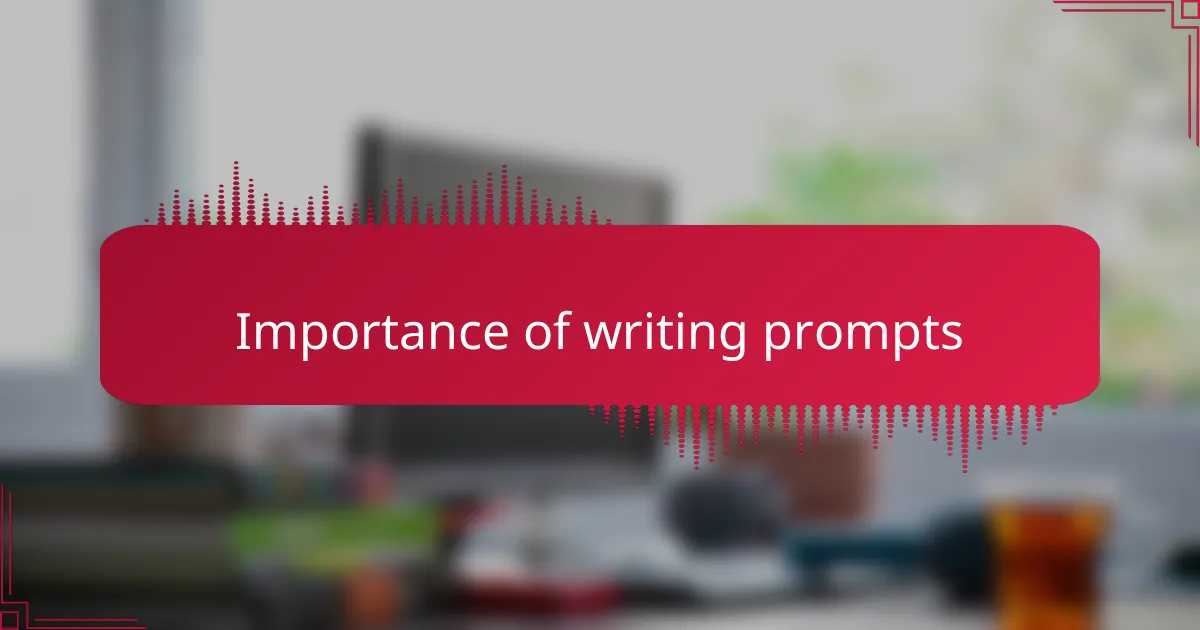
Importance of writing prompts
Writing prompts can be invaluable tools for breaking through the frustrating barrier of writer’s block. From my experience, a simple prompt can ignite a spark of creativity I didn’t even know I had. I remember sitting in front of a blank page, feeling lost, when a prompt about an unexpected hero suddenly flooded my mind with ideas—and just like that, the story took off.
When used effectively, writing prompts can help generate fresh ideas and perspectives, allowing us to explore new directions we might not have considered before. They serve as a springboard into our imaginations, helping to whittle away the anxiety of creating something perfect right out of the gate. Here are some reasons why writing prompts are so crucial:
- Stimulate creativity and fresh ideas.
- Provide structure when thoughts feel scattered.
- Encourage exploration of different genres and themes.
- Serve as a warm-up exercise for deeper writing.
- Help break monotony by introducing unexpected scenarios.
With these insights in mind, prompts can transform the writing process into an inspiring journey rather than a daunting task.
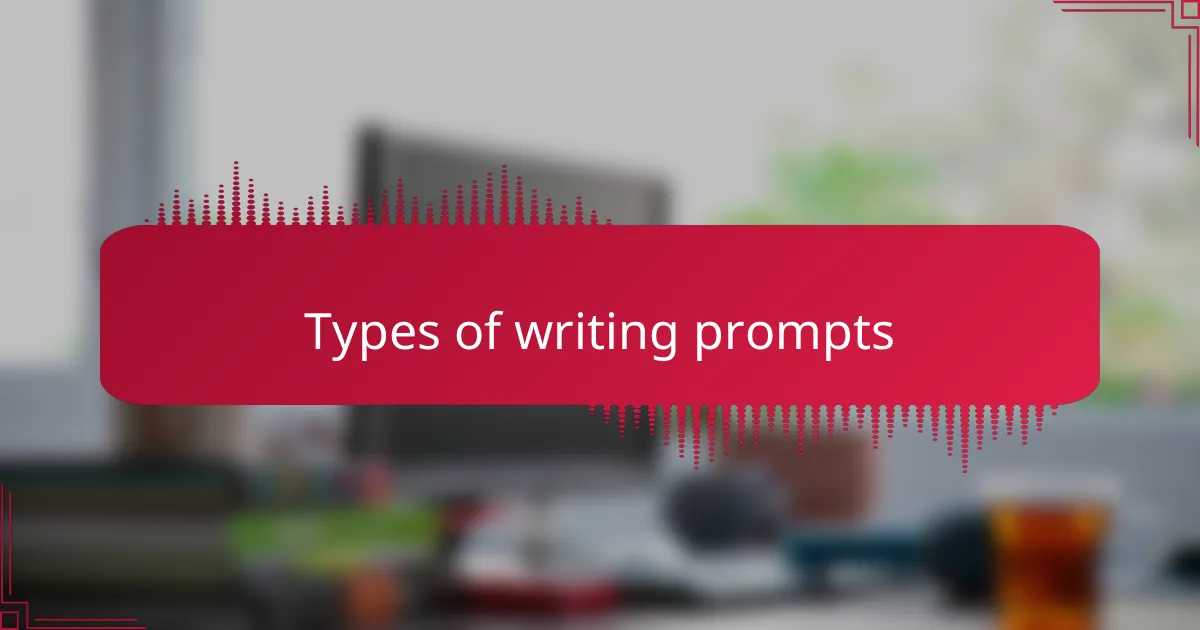
Types of writing prompts
There are various types of writing prompts, each designed to evoke different thoughts and ideas. For instance, character-driven prompts invite you to dive into the psyche of a character. I distinctly remember one prompt that asked me to write about a character facing a moral dilemma. It pushed me to explore their emotions and motives, leading to a depth in my storytelling that I hadn’t tapped into before.
Another category is scenario-based prompts. These get your imagination racing by presenting you with unique situations to develop. I once encountered a prompt about a world where colors didn’t exist. That quirky idea challenged me to conceptualize not only how that affected the characters but also how to convey their struggles and experiences without relying on visual details. It was a refreshing exercise that reminded me of the role of sensory descriptions in comic storytelling.
Finally, there are thematic prompts, which focus on a specific theme or message. These can be particularly helpful when you want to explore a certain idea, like heroism or sacrifice. I remember a prompt that invited me to write about a hero who failed, and it pushed me to rethink traditional narratives around success. Engaging with these different types of prompts has not only helped me break through writer’s block but also enriched my writing style significantly.
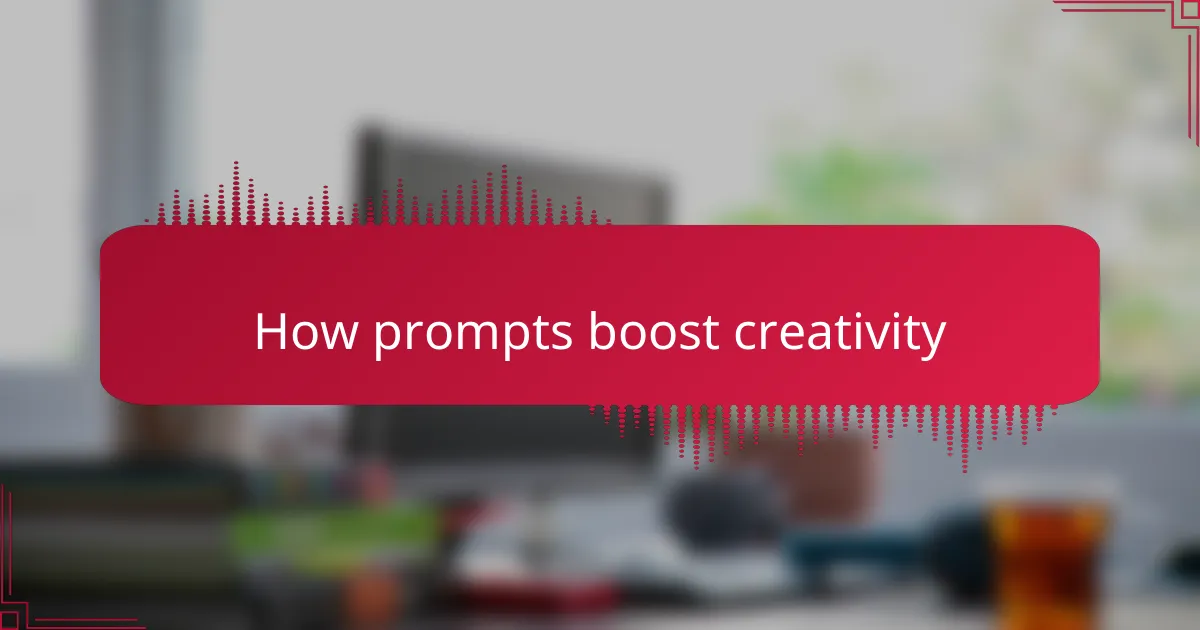
How prompts boost creativity
When I use writing prompts, I often feel my creative juices start flowing almost immediately. It’s fascinating how a simple question or scenario can unlock hidden thoughts and ideas. For instance, I once encountered a prompt that asked me to imagine a day in the life of a villain. This one little nudge shifted my perspective, allowing me to develop not just the villain’s actions but also their motivations and struggles.
In my experience, prompts also serve as a catalyst for unexpected connections. They challenge us to think outside our usual boxes and explore concepts we might overlook otherwise. I remember a prompt that asked me to describe a scene without using dialogue. It was quite the challenge! Yet, forcing myself to convey emotions through action and imagery deepened my understanding of storytelling’s nuances, especially in comics, where visuals play such a significant role.
Moreover, writing prompts can help ease the pressure that often accompanies creative projects. Instead of seeking the perfect story from the start, prompts allow you to play and experiment. I frequently remind myself that writing is not just about the end product but the journey of discovery along the way. Isn’t it remarkable how a few words can transport us into different worlds and perspectives?
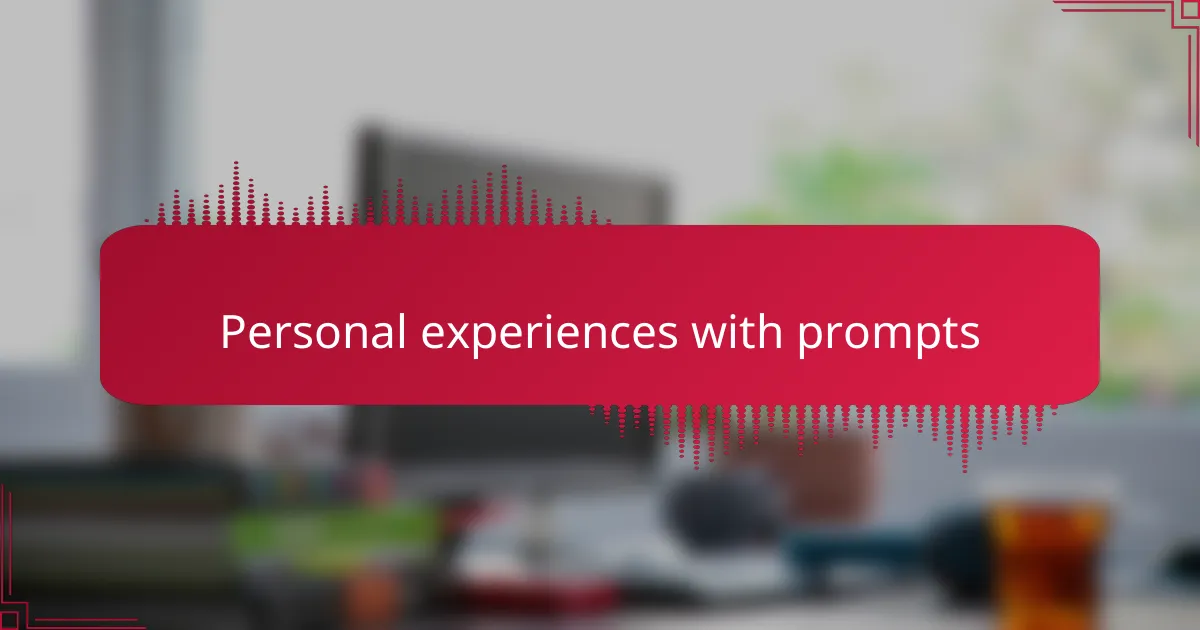
Personal experiences with prompts
Using writing prompts has been a game-changer for me. I remember one particularly challenging day when I felt completely lost. Then, a prompt about a character finding a hidden door caught my eye, and suddenly, ideas began to flow. It felt like a spark had ignited, leading me down a path I hadn’t anticipated.
What really stands out to me is how prompts can take you places you didn’t realize you needed to go. Once, I worked from a prompt that told me to focus on a character’s biggest regret. This exercise not only opened a floodgate of emotions but also deepened my understanding of the character’s motivations. Isn’t it fascinating how a few words can lead you to profound insights about your own characters?
I’ve also found that prompts help me avoid perfectionism. Instead of fretting over every detail, I can let my imagination run wild. One day, a whimsical prompt about a talking animal forced me to embrace silliness, and that joy infused my story with unexpected charm. It reminded me that creativity thrives in playfulness—what better way to write than to have fun with it?
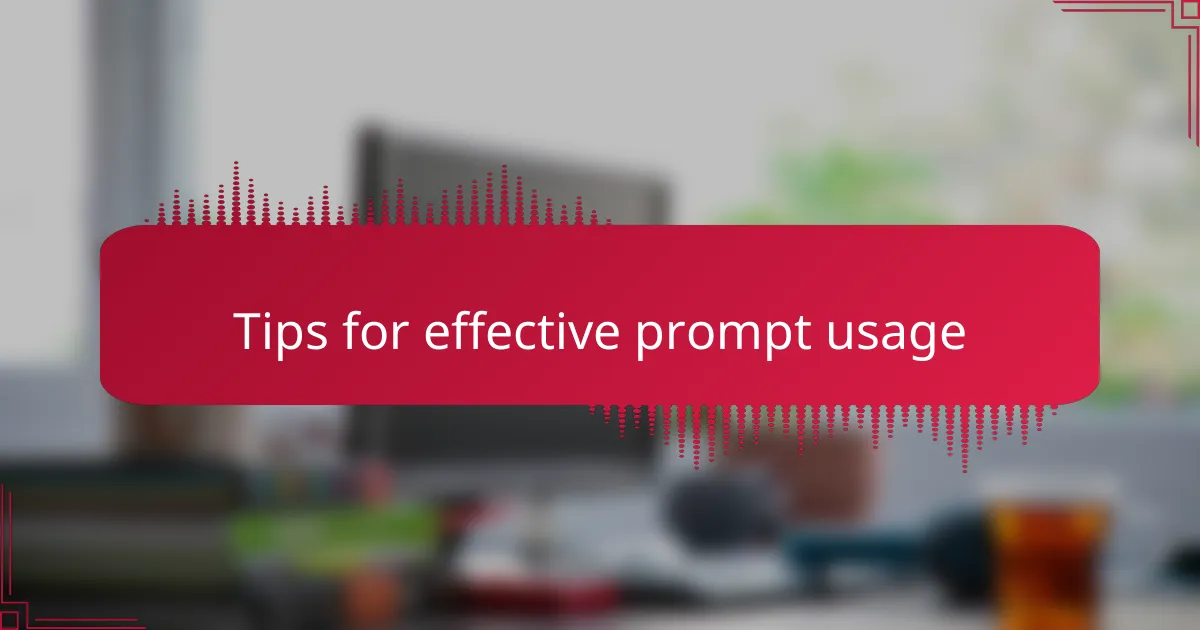
Tips for effective prompt usage
Using writing prompts effectively can transform a blank page into a world of possibilities. I often find that a well-chosen prompt can ignite my imagination in ways I never expected. For example, while grappling with writer’s block, I stumbled upon the prompt: “What if your hero had to face their greatest fear in a parallel universe?” This simple idea unraveled a whole storyline I hadn’t considered before.
To maximize the benefit of prompts, I recommend the following strategies:
– Choose prompts that resonate with your current project or interests to keep motivation high.
– Set a timer for 10-15 minutes and write continuously, allowing your thoughts to flow without self-editing.
– Use visual aids, like mood boards or character sheets, alongside prompts to deepen your engagement.
– Don’t hesitate to modify prompts; tweak them until they feel like a perfect fit for your unique narrative vision.
– Try combining multiple prompts for a richer, layered concept.
Experimenting with prompts can often lead to surprising breakthroughs. Embrace the journey, and you might just discover new facets of your characters!
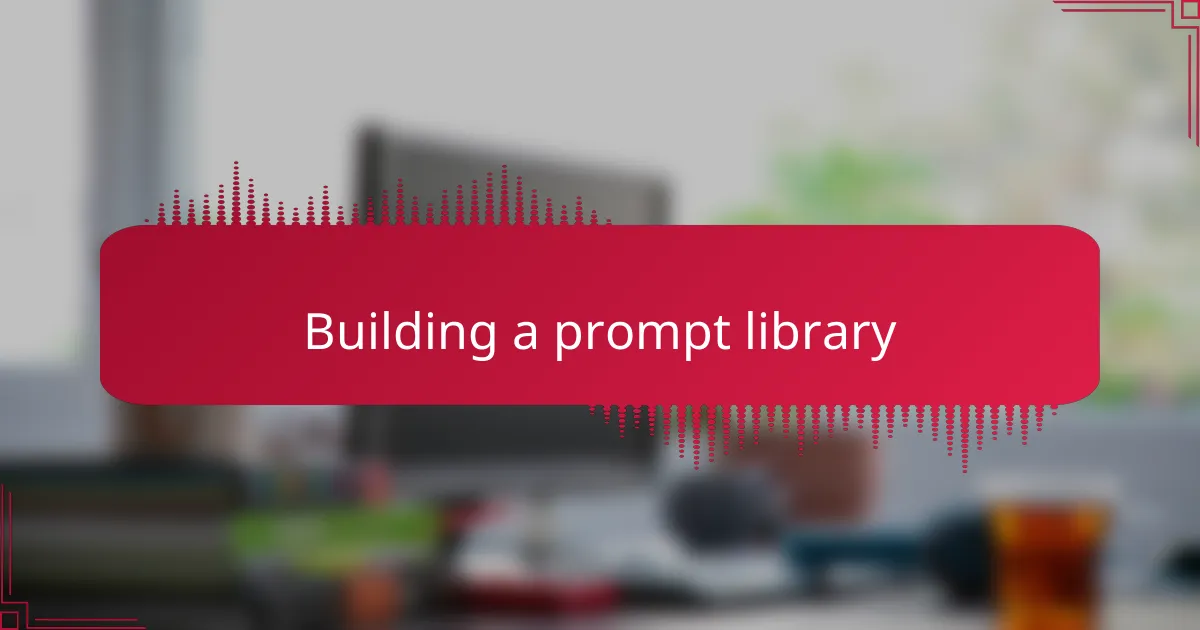
Building a prompt library
Building a prompt library has been a game-changer in my writing journey. Whenever I hit a wall, I can effortlessly dive into a collection of prompts that inspire creativity and spark new ideas. It’s like having a treasure chest of inspiration at your fingertips.
I’ve learned to tailor my prompts to fit various moods and genres, ensuring that there’s always something relevant when I’m stuck. For instance, when I feel overwhelmed, I gravitate towards light-hearted, character-driven prompts. By creating this library, I’ve turned writer’s block from an intimidating foe into just another challenge to tackle with excitement.
Here’s a comparison table that illustrates different types of prompts and their specific uses:
| Prompt Type | Use Case |
|---|---|
| Character Development | Explore backstories or motivations of characters. |
| Setting Prompts | Inspire unique environments for your comic. |
| Dialogue Prompts | Focus on conversations that reveal character traits. |
